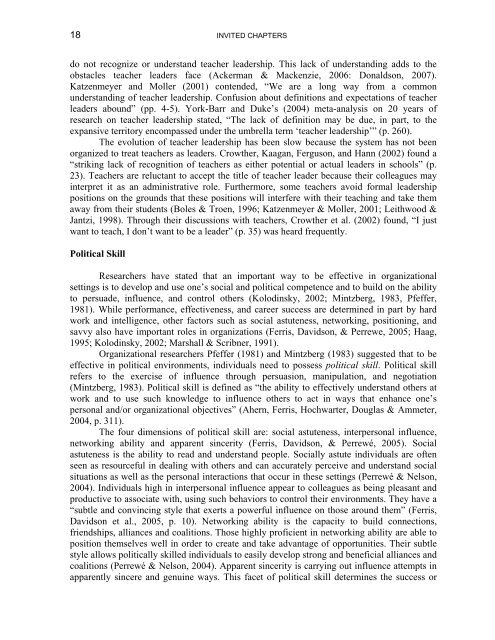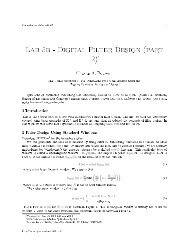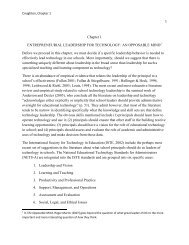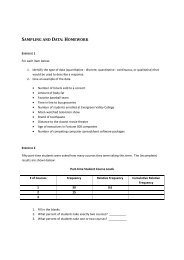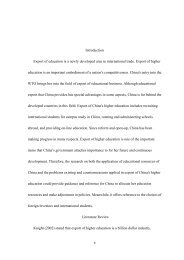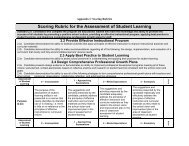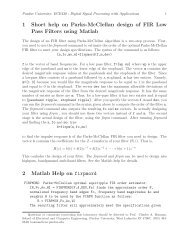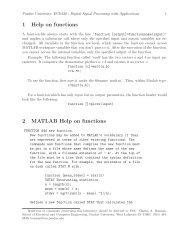Blazing New Trails - Connexions
Blazing New Trails - Connexions
Blazing New Trails - Connexions
You also want an ePaper? Increase the reach of your titles
YUMPU automatically turns print PDFs into web optimized ePapers that Google loves.
18 INVITED CHAPTERS<br />
do not recognize or understand teacher leadership. This lack of understanding adds to the<br />
obstacles teacher leaders face (Ackerman & Mackenzie, 2006: Donaldson, 2007).<br />
Katzenmeyer and Moller (2001) contended, “We are a long way from a common<br />
understanding of teacher leadership. Confusion about definitions and expectations of teacher<br />
leaders abound” (pp. 4-5). York-Barr and Duke’s (2004) meta-analysis on 20 years of<br />
research on teacher leadership stated, “The lack of definition may be due, in part, to the<br />
expansive territory encompassed under the umbrella term ‘teacher leadership’” (p. 260).<br />
The evolution of teacher leadership has been slow because the system has not been<br />
organized to treat teachers as leaders. Crowther, Kaagan, Ferguson, and Hann (2002) found a<br />
“striking lack of recognition of teachers as either potential or actual leaders in schools” (p.<br />
23). Teachers are reluctant to accept the title of teacher leader because their colleagues may<br />
interpret it as an administrative role. Furthermore, some teachers avoid formal leadership<br />
positions on the grounds that these positions will interfere with their teaching and take them<br />
away from their students (Boles & Troen, 1996; Katzenmeyer & Moller, 2001; Leithwood &<br />
Jantzi, 1998). Through their discussions with teachers, Crowther et al. (2002) found, “I just<br />
want to teach, I don’t want to be a leader” (p. 35) was heard frequently.<br />
Political Skill<br />
Researchers have stated that an important way to be effective in organizational<br />
settings is to develop and use one’s social and political competence and to build on the ability<br />
to persuade, influence, and control others (Kolodinsky, 2002; Mintzberg, 1983, Pfeffer,<br />
1981). While performance, effectiveness, and career success are determined in part by hard<br />
work and intelligence, other factors such as social astuteness, networking, positioning, and<br />
savvy also have important roles in organizations (Ferris, Davidson, & Perrewe, 2005; Haag,<br />
1995; Kolodinsky, 2002; Marshall & Scribner, 1991).<br />
Organizational researchers Pfeffer (1981) and Mintzberg (1983) suggested that to be<br />
effective in political environments, individuals need to possess political skill. Political skill<br />
refers to the exercise of influence through persuasion, manipulation, and negotiation<br />
(Mintzberg, 1983). Political skill is defined as “the ability to effectively understand others at<br />
work and to use such knowledge to influence others to act in ways that enhance one’s<br />
personal and/or organizational objectives” (Ahern, Ferris, Hochwarter, Douglas & Ammeter,<br />
2004, p. 311).<br />
The four dimensions of political skill are: social astuteness, interpersonal influence,<br />
networking ability and apparent sincerity (Ferris, Davidson, & Perrewé, 2005). Social<br />
astuteness is the ability to read and understand people. Socially astute individuals are often<br />
seen as resourceful in dealing with others and can accurately perceive and understand social<br />
situations as well as the personal interactions that occur in these settings (Perrewé & Nelson,<br />
2004). Individuals high in interpersonal influence appear to colleagues as being pleasant and<br />
productive to associate with, using such behaviors to control their environments. They have a<br />
“subtle and convincing style that exerts a powerful influence on those around them” (Ferris,<br />
Davidson et al., 2005, p. 10). Networking ability is the capacity to build connections,<br />
friendships, alliances and coalitions. Those highly proficient in networking ability are able to<br />
position themselves well in order to create and take advantage of opportunities. Their subtle<br />
style allows politically skilled individuals to easily develop strong and beneficial alliances and<br />
coalitions (Perrewé & Nelson, 2004). Apparent sincerity is carrying out influence attempts in<br />
apparently sincere and genuine ways. This facet of political skill determines the success or


